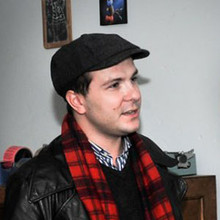
Two Russian journalists and an environmental activist have been beaten up within a week. It's easy to blame it on the Russian government, but the problem runs deeper.
Contrary to what Western coverage suggests, Russian internet remains a relatively censorship-free zone. Yes, NGOs and opposition papers and websites have had their servers and computers confiscated – mostly under charges of copyright infringement on behalf of Microsoft, which was being used so often it issued a statement condemning the practice and granted all advocacy groups absolution from piracy – but to portray Russia as a bloodthirsty dictatorship where journalists are little more than target practice is just not fair. Reporters Without Borders, whose rating puts Russia only eight places above the human rights nightmare that is the Democratic Republic of Congo, isn't without controversies of its own, and its methodology far from perfect. Moreover, you'll have to dig deep to find a story in Russian press (TV is different) that's not in one way or another critical of the government, local authorities or big business.
Oleg Kashin – now an internationally known Russian reporter who suffered brutal beating for something that he'd written – was the only journalist to interview Anatoly Barkov, vice-president of oil giant Lukoil, who is assumed to be responsible for the death of two women whose Citroen happened to be in front of Barkov's black Mercedes. The interview failed to convince anybody of Barkov's innocence, but Kashin's was the sole attempt at objectivity, which is supposed to be a core journalistic value.
The problem with journalism in Russia is not censorship, unfortunately – that would be easy to deal with. The problem is the general circumstances in which Russian media workers have to exist. Journalists in Russia are not unionised. There isn't a single organisation overseeing adherence to professional ethics, helping deal with nonpaying employers, providing legal support to its members etc.
There is, in fact, a Union of Journalists of Russia, but it's a dusty old care home for Pravda veterans, the sole function of which seems to be issuing international press cards.
But as a journalist in Russia, if you don't work for a major national news outlet with its own security and legal departments, you're on your own.
It wasn't the deliberate sadism of the attack on Oleg Kashin, who had his jaw, fingers and legs broken to prevent him from speaking, writing or going anywhere for several months, that was most shocking, but the orgy of gloating comments that followed, posted in response to a BBC article on the Kashin disaster on Russian aggregator InoSMI.ru: "Another hack goes down"; "He got what he deserved"; "Why does he get such attention, ordinary people are crippled and killed every day".
These sentiments are probably shared by investigators who, immediately after Dmitry Medvedev's promise to put Kashin's case under "special control", leaked gruesome CCTV footage of Kashin's beating to a tabloid and now seem to be doing their best to convince everybody that it wasn't Oleg's occupation that motivated the attack. A police officer reportedly told people who convened at the Central Investigation Unit building to demand action against Kashin's attackers: "You journalists are to blame yourselves for this kind of attitude" - which equates to blaming a rape victim for provoking the rapist or hating an actor for playing a bad guy.
It's the medieval urge to shoot the messenger who brings bad news that is especially damaging to journalists in Russia, and you can't blame it all on Putin. I used to stand in for the Clubs editor in Time Out Moscow (a position where the biggest occupational hazard was supposed to be a royal hangover after another opening) and I had calls at 3am from club owners on a cocaine binge threatening to "come and find me" over a line in a review in which I meekly complained of the lack of ventilation or an unimpressive Long Island.
You see the line of thought there – the first thing they did wasn't installing better AC or scolding the bartender for diluting drinks with water. It was going after the journalist who pointed out a flaw in their enterprise. Imagine what can happen when a multimillion under-the-table deal is involved.
Khimki forest – four acres of litter-strewn arboreous mediocrity on the northern outskirts of Moscow – has become a complex study in shady deals involving multinational corporations and ruthless big business versus brave but gravely outnumbered activists. Three of the latest brutal attacks against environmental activists and journalists - Mikhai Beketov, Oleg Kashin, Konstantin Fetisov - are directly related to the Khimki forest scandal, but the consistent lack of progress on any of those cases is already encouraging thugs hired by Big Timber and road construction firms – among the most lucrative, hence the most corrupt businesses in Russia - to harass activists daring to defend other public parks and forests.
So it's not Putin or Medvedev who are responsible for the journalists' plight. But they have the power to stop it. Conduct a fair and public investigation, punish those responsible, for the whole of Russia – and the world – to see, and hopefully that will act as a deterrent to those who consider the press a mere nuisance on their way to unlimited wealth. Then we'll have to deal with the attitude.
Free daily newsletter
If you like our news and feature articles, you can sign up to receive our free daily (Mon-Fri) email newsletter (mobile friendly).
Related articles
- Reporting on Big Tech, with Niamh McIntyre of The Bureau of Investigative Journalism
- Predictions for journalism 2024: misinformation, online safety and press freedom
- New digital platform helps support free press in Sudan
- Peter Jukes: 'More diversified media ownership is in the public interest'
- Three steps to protect newsrooms from press freedom attacks









